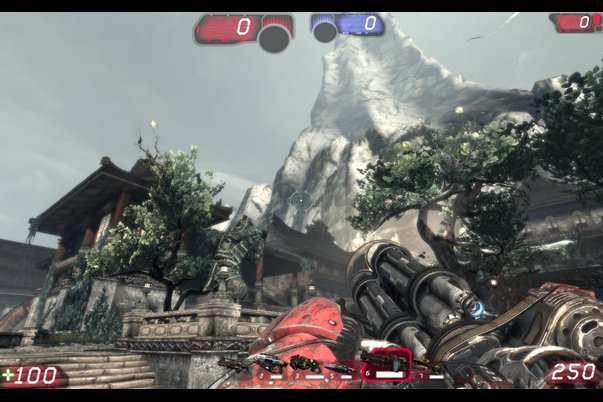The Epic tradition
The masters of Unreal talk gore and combat
Oct 26, 2007
Inside an office in sunny Raleigh, North Carolina, Epic vice president Mark Rein settles back into a comfy seat. "It all started way back in the stone age," he begins. "You know, Tim Sweeney started the company in his parents' basement in Maryland." Today Epic is out of the basement and has the two monster-sized gamesUnreal Tournament 3andGears of War (PC) in development.
Outside of Mark's office, staff members play on the Epic basketball court, others help themselves to a mountain of saturated fat in a snacking area that would make Elvis blush, and a dummy sits in the echoing halls of a super hi-tech motion capture suite just waiting to be hurled off a ledge for the fiftieth time. Others still beaver away on Unreal Tournament III, presumed further iterations of Gears of War and engine tech that will have an inordinate number of games we've barely dreamt of plugged into its guts. There's no disputing it, Epic Games have come a long, long way since their original birth as Potomac Computer Systems back in 1991.

Above: The Unreal Anthology's next game, Unreal Tournament III, looks frickin' sweet
It began in the days of shareware - a concept that readers of more tender years will be surprised to learn involved giving away a quarter of a game for free on bulletin boards before taking payment for the full game in said parent's basement, before personally boxing everything up and shipping it. Rein himself joined up with Sweeney a year after ZZT during work on sexy-dagger lady romp Jill of the Jungle, and on his first day snapped up foul-mouthed boy genius Cliff "CliffyB" Bleszinski - soon-to-be creator of Jazz Jackrabbit. Then, borrowing a concept from a group of chaps on the Swedish demo scene who, despite Rein's exhortations, were reluctant to become millionaires, Epic Pinball was born in the halls of Epic collaborators Digital Extremes - and the cash really started to roll in.
The beginnings of Unreal, however, were about to take shape. "Around 1995 the game industry was growing a lot and the simple, smaller games we were making then weren't as big sellers as they had been in the past," picks up Epic founder Tim Sweeney. "So we tried to take on a really big project, and started on Unreal. It took three and a half long, painful years of learning." It all began with a demo made by Digital Extremes man James Schmaltz, described by Rein as "a cool flying dragon over a Magic Carpet-style landscape," and progressed into the sci-fi romp that gamers would love and become lost in from time to time - very much the anti-Quake of its day.
Sign up to the GamesRadar+ Newsletter
Weekly digests, tales from the communities you love, and more


